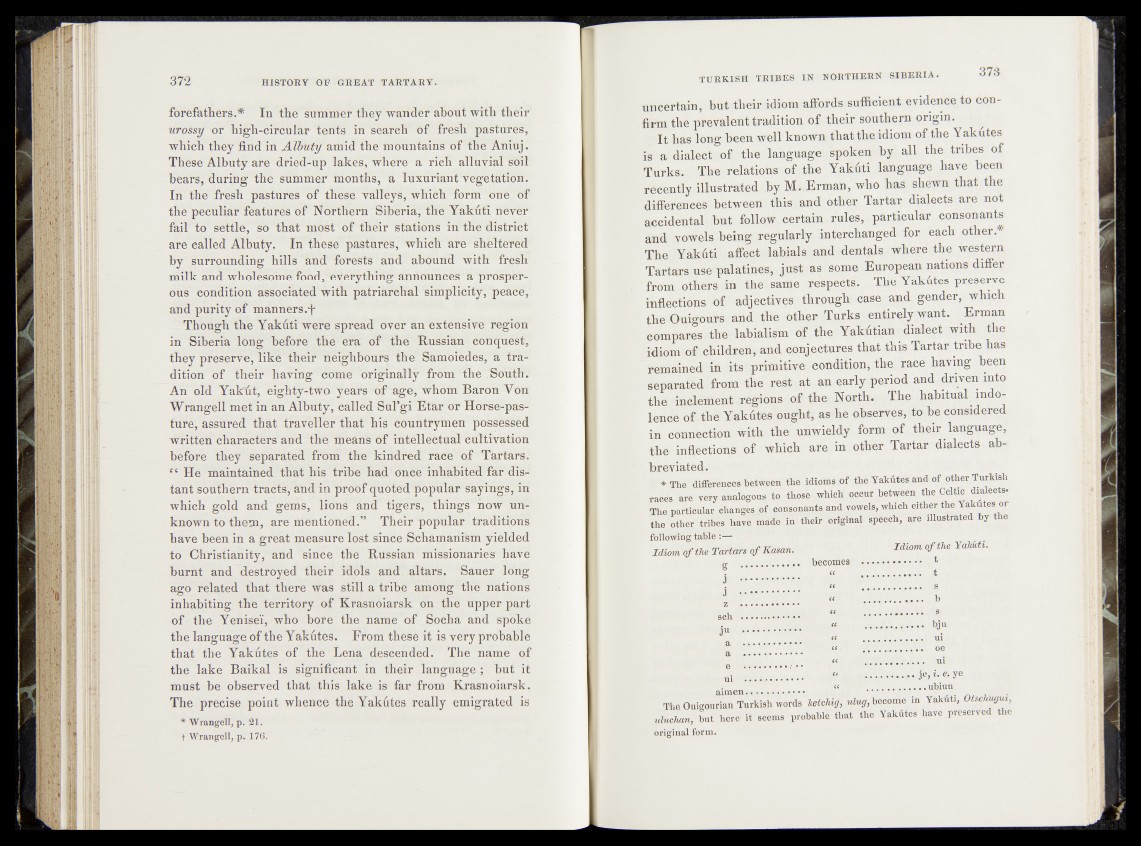
forefathers.* In the summer they wander about with their’
urossy or high-circular tents in search of fresh pastures,
which they find in Albuty amid the mountains of the Aniuj.
These Albuty are dried-up lakes, where a rich alluvial soil
bears, during the summer months, a luxuriant vegetation.
In the fresh pastures of these valleys, which form one of
the peculiar features of Northern Siberia, the Yakuti never
fail to settle, so that most of their stations in the district
are called Albuty. In these pastures, which are sheltered
by surrounding hills and forests and abound with fresh
milk and wholesome food, everything announces a prosperous
condition associated with patriarchal simplicity^, peace,.
and purity of manners.^
Though the Yakuti were spread over an extensive region
in Siberia long before the era of the Russian Conquest,
they preserve, like their neighbours the Samoiedes, a tradition
of their having cbme originally from the .South.
An old Yaktit, eighty-two years trirage, whom Baron Yon
Wrangell met in an Albuty, called Sul’gi Etar or Horse-pasture,
assured that traveller that his countrymen possessed?
written characters and the means of intellectual cultivation
before they separated from the kindred race of Tartars.
“ He maintained that his tribe had once inhabited Tar dis-
tant southern tracts, and in proof quoted popular sayings, in
which gold and gems, lions and tigers, things how unknown
to them, are mentioned.’* Their popular traditions
have been in a great measure lost since Schamanism yielded
to Christianity, and since the Russian missionaries have
burnt and destroyed their idols and altars. Sauer long
ago related that there was still a tribe among the nations
inhabiting the territory of Krasnoiarsk on the upper part
of the Yenisei, who bore the name of .Socha and spoke
the language of the Yakfites. From these it is very probable
that the Yakutes of the Lena descended. The name of
the lake Baikal is significant in their language ; but it
must be observed that this lake is far from Krasnoiarsk.
The precise point whence the Yakdtes really emigrated is
* Wrangell, p. 21.
t Wrangell, pi 176.
uncertain, but their idiom affords sufficient evidence to confirm
the prevalent tradition of their southern origin.
It has long been well known that the idiom of the Yakutes
is a dialect of the- language spoken by all the tribes of
Turks. The relations of.the Yakuti language have been
recently illustrated by MvErman, who has shewn that the
differences between this and other Tartar dialects are not
accidental but follow certain rules, particular consonants
and vowels being regularly interchanged for each other.
The Yakfiti affect labials and dentals where the western
Tartars use palatines, just ar's^de-European nations differ
" from others the same ^respects. The Yakiites preserve
inflections of adjectives;»through case and gender, which
the Ouigours and the other Turks entirely want. Erman
compares the labialism of the Yakfitian dialect with: the
idiom of children, and conjectures that »this Tartar tribe has
remained knits primitive condition, the race havipg been
separated from the rest at an early period and driven into
the inclement regions of the North. The habitual indo,
lence of the Yakutesnught, as-he observes, to be considered
in connection with the unwieldy form of their language/
the inflections of which are in other Tartar dialects abbreviated.
* The differences between th e idioms of th e Yakdtes and of^tfaer5Turkish
racés are very analogous to those which’ occur between ^ W c ^ d ia ie c ts .
The particular changes of consonants and yqwelsj.which Yakutes or
the other tribes have made in their original speech“, are' illustrated by the
following table’:—
Idiom qfthe Tartars of Kazan. ' f Idiom ° f the YaMt*‘
a . . . . . i........... becomes'• .............„•••• A
sch
ju bju
je; %. e. ye
...u b id n
Tka Ouisrourian Turkish words Mchtg, «tug, become in Yakdti, O ts c h y v ,
Mchan , but here It seemi ptokabli tlmt the YakMe. hate presorted the
original form.